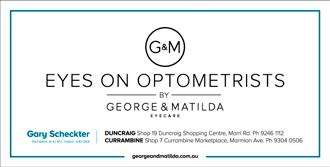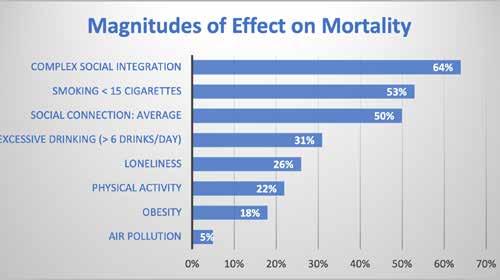
3 minute read
Longevity: How to Make the Most of It
As part of the function Glen Dunkerton from Regional Men’s Health Initiative was also able to give those in attendance a brief presentation on issues that affect Men in WA and how we can help. The partnership between Regional Men’s Health and Bowls WA seeks opportunities at regional clubs for the RMHI team to encourage men to talk openly about men’s health issues particularly but not limited to mental health, alcohol consumption, prostate etc.
Bowls WA CEO Ken Pride, President Larry Bandy, and attending Board members thanked those who had given their time in recent years on committees and or in the promotion of the sport of bowls. Of note was the Badge of Merit awarded to long time and only recently former Bowls WA Umpires Chair Michael Garratt.
Advertisement
Also receiving an award was Anne Lilley from Sorrento who is a long time servant in the Inter Region Round Robin and Bowls Management Committee. Unfortunately Anne was not able to attend the event.
Volunteers are the life blood of any club and we again thank our members for their efforts and commitment to volunteer and encourage others to have a go.
– Aaron Delaporte and Brian Lucas
Longevity: How to Make the Most of It
Professor Julianne Holt-Lunstad, a university researcher, addressed the question of longevity in studies of tens of thousands of middle-aged people. She looked at their lifestyle, diet, exercise, marital status, how often they went to the doctor, whether they smoked or drank, etc. She recorded all of this and waited for seven years to see who would still be breathing and what had reduced their chances




of dying the most? Going from the least powerful predictor to the strongest she found that:
• Air Pollution: Clean air doesn't predict how long you will live. • Obesity: Whether you're lean or overweight, you can stop feeling guilty about this, because it's only in second place • Physical Activity: How much exercise you get is next, still only a moderate predictor and whether you've had a cardiac event • Loneliness: Ranks as number four • Excessive Drinking: Whether you were drinking and quit, or whether you're a moderate drinker, this comes in at number five • Social Connection: Social connection can lower anxiety and depression and comes in at number six • Smoking: Whether you don't smoke, or if you did, whether you quit it at age seven!

After reading this list I seriously feel like a drink and a smoke, a Bex and a lie down. Anyhow, getting towards her top predictors for longevity are two features of your social life.
47
First, she says are your close relationships. “These are the people that you can call on for a loan if you need money suddenly, who will call the doctor if you're not feeling well or who will take you to the hospital, or who will sit with you if you're having an existential crisis or if you're in despair.” If they were happy, it’s unlikely that they will be once they receive a call from you! (Just joking!)
She says “Those people, that little clutch of people is a strong predictor, if you have them, of how long you'll live. And then something that surprised me, something that's called social integration. This means how much you interact with people as you move through your day. How many people do you talk to each day?”
She goes on to say that your interaction with this little clutch of people could be identified by: • Do you talk to the guy who every day makes you your coffee? • Do you talk to the postman? • Do you talk to the woman who walks by your house every day with her dog? • Do you play bowls, croquet, darts, bridge or poker? • Do you belong to a book club?
Remember, these people were probably happy before you spoke to them – just joking! But seriously, maintaining close contact with good friends, interacting with people you come into contact with, being part of a community such as Sorrento and giving a supporting and compassionate hand to people in need is both beneficial for them and good for your own well-being.
Stay involved, stay connected and enjoy each day as it comes.
– Thanks to Julianne Holt-Lunstad, who inspired this article









